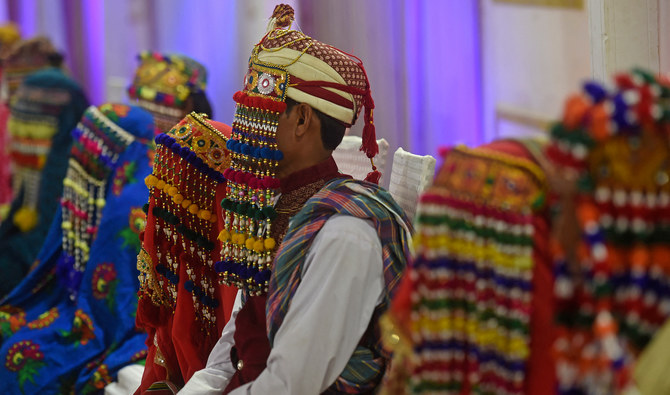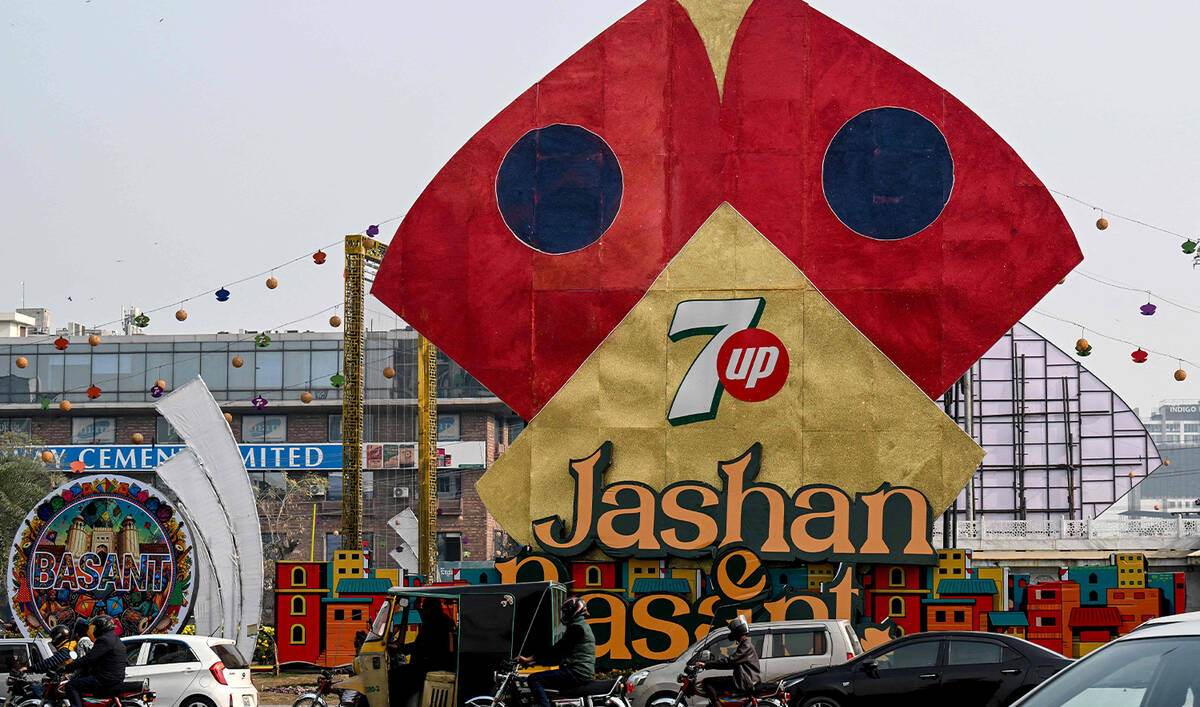KARACHI: There’s a scrum of people trying to get photos with the married couple at the Radiance banquet hall, and you can barely hear someone talk above the din of 400 guests tucking into biryani and chicken tikka, music and the drone whirring around the room. The bejeweled bride and her natty groom are beaming.
Outside, the street is jammed with cars heading to wedding parties in neighboring banquet halls, L’Amour, Candles and Hill Top. Hill Top, a multiplex, has three weddings going on at once.
It’s winter in Pakistan, and that means weddings. Lots of weddings. During the cooler weather between November and February, millions of people attend weddings every week. Pakistani diaspora come home from around the world for the season, packing airport arrival halls and five-star hotels.
People call it Decemberistan.
“December is when everybody has an excuse to put a pause on worrying, whatever income level you are,” said Karachi-based communications consultant Khizra Munir. “Everyone’s on the same page that we’re going to live in the moment. It’s a great time to have a reunion, a great excuse to dress up.”
Weddings are one of the few opportunities for people in the conservative Muslim country to socialize and party. So it’s no surprise that people draw them out a bit.
A typical Pakistani wedding means at least three events, and often more: there’s the engagement, the gathering when friends and family apply turmeric paste to the bride’s hands and face in a pre-glam ritual, another party for applying henna to the bride’s hands and feet — which, of course, means more music and dancing. The bride gets a procession. So does the groom.
In Karachi’s Cantonment area, Yamima Teresa Bhagtaney and Sharoon Arjumand John tied the knot at Holy Trinity Cathedral.
Guests thumbed through the order of service, which one Muslim guest in the pews said was “very helpful” for navigating the Christian ceremony.
The wedding had the hallmarks of a traditional Christian wedding — a white dress, hymns, choristers, an organist, the exchange of vows and rings — and a traditional Pakistani one, with multiple photographers and videographers capturing every detail.
They even accompanied the bride up the aisle, but stopped short when the couple and their families received Holy Communion.
The groom’s father, Bishop of Karachi the Right Rev. Frederick John, said Christian weddings were celebrated the same way as any other wedding in Pakistan, including the mehndi – when the bride receives henna on her hands and feet – and a dholki, when guests gather at a family member’s house to sing and dance.
Pakistani weddings only seem to be getting more elaborate.
Munir said she went to 10 events for the wedding of one family friend this season, wearing a different outfit each time. She said weddings have become so big and “over the top” that it’s sometimes hard to build an emotional connection. “It’s all about outfits, what you’re wearing, who you’re wearing, have you posted a picture of your outfit.” The latest trend is guests hiring a choreographer to help them perfect a dance performance.
Then there’s the cost of all those parties. A wedding event in a banquet hall like Radiance can cost upwards of 1 million rupees ($3,576), a hefty price tag in a country whose annual GDP per capita is just over $1,500 and inflation is running high. A wealthier family could easily spend 10 to 20 million on one party.
Banks offer loans and other wedding financing of up to 3 million rupees. Welfare institutions, including a Pakistani government one, support people from disadvantaged backgrounds or low-income households to pay for weddings.
But people still look forward to the wedding season, in spite of its demands on the wallet and wardrobe. “Worrying about how all of this is going to be managed and the financial burden of it, that’s all year,” said Munir. “Decemberistan is the opposite of stressing about the finances.”
The bride at Radiance is called Dua — “like Dua Lipa,” said her husband Asher — and she went to three other weddings this season. “It wasn’t really hard because I was prepared for everything,” said Dua. “I love the wedding season. It’s about people getting together to celebrate.”
Fizza Bangash expected to attend 10 to 12 events during the season. “In Islamabad, there are areas where you have lots of marriage halls in one place, so you can jump from one event to another quite easily.”
Bangash got married on Dec. 25 at The Pavilion, Islamabad’s oldest wedding hall, with 350 guests including people from Germany, Australia, the UK and the US If she had her way, it would have been closer to 100.
But good manners requires inviting extended family, work colleagues of the couple and their parents and neighbors. Host families also need to consider whose weddings they have been invited to and reciprocate accordingly to avoid a social faux pas.
Bangash has fond memories of the homespun weddings she went to as a child. People set up a tent on the ground outside their home and invited close family and friends.
“Now there are so many expectations about the food, decor, sound system and marquee,” she said.
There are a dozen venues around The Pavilion, boxy on the outside and blingy on the inside, and several more are under construction.
At Pacific Mansion, bookings are smaller than last year because of inflation and competition from the new venues, while the newest arrival – Zircon – is still accepting relatively tiny 100-person bookings to drum up custom.
The Manor hosted 35 events in December, and 28 in January. “We’ve only been open seven or eight months and this is our first season. It’s gone better than we could have dreamt of,” said the hall’s general manager, Syed Hassan Mahdi.
“The trend at the moment for weddings is for live cooking stations — steak, pasta. It’s impossible for people to do this at home,” he said.
Of course, some families still do it the old way.
In Karachi’s Lines neighborhood, a marquee sat on open ground in a residential area. There was no fancy decoration, expensive furniture or valet parking. In fact, there wasn’t a bathroom. Guests arrived on motorbikes or in brightly colored buses.
In a makeshift outdoor kitchen, the wedding caterers were preparing kebabs and flatbread by flashlight because of an hours-long power cut.
The groom’s family had rented a generator, but it broke down, leaving everyone in the dark just as the newlyweds began posing for photographs. The groom, Abdul Rehman, looked annoyed; the bride, Mehmoona, looked resigned. Guests whipped out their phones, using them as torches until the electricity came back.
The groom’s uncle, Mehmood Anwar, said the family invited around 400 people, and event cost less than 400,000 rupees. “There’s no point in spending so much money on a wedding,” Anwar said. “You can give that money to your daughter or son-in-law.
“We did everything ourselves. It took a full day to set this up,” said Anwar, pride in his voice.
By the time March rolls around, Pakistanis will go back to dealing with the warmer weather and everyday woes, including the bills for all those parties. But for now, it’s still Decemberistan.
“The whole objective is, for that pocket of time, forget about everything that’s dragging us down,” Munir said. “We’ve got political unrest. We’ve got insane inflation like we’ve never seen before... Every year we’re just like, it can’t get worse, but it does get worse. But, suddenly, December arrives.”













